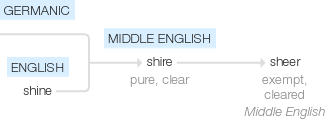Sheer
Middle English (in the sense ‘exempt, cleared’): probably an alteration of dialect shire ‘pure, clear’, from the Germanic base of the verb shine. In the mid 16th century the word was used to describe clear, pure water, and also in sheer1 (sense 3 of the adjective).
wiktionary
From Middle English shere, scheere, schere, skere, from Old English sċǣre; merged with Middle English schyre, schire, shire, shir, from Old English sċīr(“clear, bright; brilliant, gleaming, shining, splendid, resplendent; pure”) and Middle English skyr, from Old Norse skírr(“pure, bright, clear”) [1], both from Proto-Germanic *skīriz(“pure, sheer”) and *skairiz, from Proto-Indo-European *sḱēy-(“luster, gloss, shadow”).
Cognate with Danish skær, German schier(“sheer”), Dutch schier(“almost”), Gothic 𐍃𐌺𐌴𐌹𐍂𐍃( skeirs, “clear, lucid”). Outside Germanic, cognate to Albanian hir(“grace, beauty; goodwill”).
Perhaps from Dutch scheren(“to move aside, skim”); see also shear.
etymonline
sheer (adj.)
c. 1200, "exempt, free from guilt" (as in Sheer Thursday, the Thursday of Holy Week); later schiere "thin, sparse" (c. 1400), from Old English scir "bright, clear, gleaming; translucent; pure, unmixed," and influenced by Old Norse cognate scær "bright, clean, pure," both from Proto-Germanic *skeran (source also of Old Saxon skiri, Old Frisian skire, German schier, Gothic skeirs "clean, pure"), from PIE root *sker- (1) "to cut."
Sense of "absolute, utter" (sheer nonsense) developed 1580s, probably from the notion of "unmixed;" that of "very steep" (a sheer cliff) is first recorded 1800, probably from notion of "continued without halting." Meaning "diaphanous" is from 1560s. As an adverb from c. 1600.
sheer (v.)
1620s, "deviate from course" (of a ship), of obscure origin, perhaps from Dutch scheren "to move aside, withdraw, depart," originally "to separate" (see shear (v.)). Related: Sheered; shearing. As a noun from 1660s.
